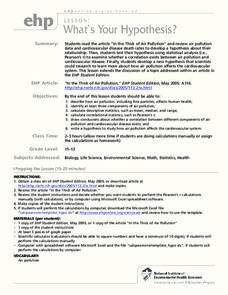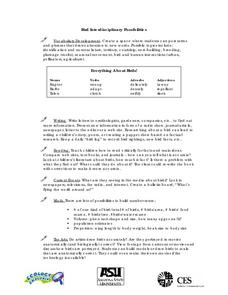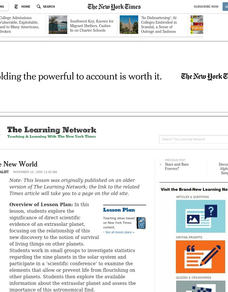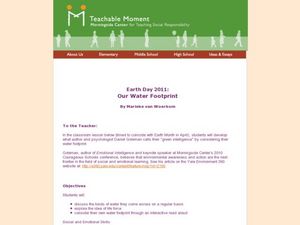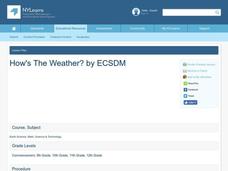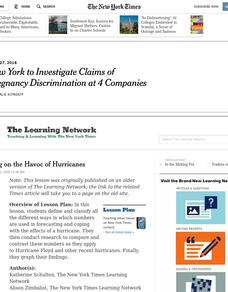Curated OER
There's a World of Science to Read Today!
Students read a current science article. They write a summary of the article, take notes, write and edit a summary, and print their work.
Global Oneness Project
Living with Less Water
Did you know that California produces two thirds of the fruits and nuts consumed in the United States? That it produces almost one third of the vegetables? Did you know that scientists warn that California is facing the onset of a...
Royal Society of Chemistry
Green Plastics—Chemistry Outreach
How do green plastics reduce waste and environmental pollution? Budding scientists create and test a variety of compounds used in green plastics during an insightful experiment. Beginning with startling statistics and ending with...
Curated OER
On the Other Hand
Students identify traits that are either genetic or developmental in nature and determine why it might be difficult to learn if handedness is genetic or developmental. They explore theories on the causes of left-handedness by reading and...
Curated OER
What's Your Hypothesis?
Find the article, "In the Thick of Air Pollution," not through the resource link in the lesson, but through an Internet search. Have high schoolers read it and perform calculations with the statistics provided. The objective is to...
Curated OER
Bird Interdisciplinary Possibilities
Students explore birds, their territory, breeding, and seasonal movement. They research and collect information on birds through writing letters to ornithologists, reading in books, comparing web sites, and observing pictures. Students...
Curated OER
Drought Threatens Huge Man-Made Lake
Students locate Lake Mead, then read a news article about Lake Mead drying up and how that would effect water and power supplies to the region. In this current events lesson, the teacher introduces the article with a map and vocabulary...
Curated OER
A Whole New World
Young scholars work in small groups to investigate statistics regarding the solar system and participate in a 'scientific conference'. They explore available information about the extrasolar planet and assess the importance of this...
Curated OER
Science on the Skids
Students discuss the decline in the sciences in America by comparing statistics and information from the U.s. to other countries. Then they write and deliver a "State of the Sciences" address to their peers.
Curated OER
Global Warming: Life in a Greenhouse
Students investigate the evidence and consequences of global warming. They read and discuss an article, conduct a debate, evaluate their community's climate statistics, log their gas consumption for a week, and develop a panel discussion...
Curated OER
Tables, Charts and Graphs
Students examine a science journal to develop an understanding of graphs in science. In this data analysis lesson plan, students read an article from the Natural Inquirer and discuss the meaning of the included graph....
Curated OER
Out Of Control
Fifth graders study wildfires in the United States. In this wildfire lesson plan students read an article, make calculations and answer questions.
Curated OER
Our Water Footprint
Students discuss the water usage of the world and their own water usage. In this water lesson plan, students read a story about water and discuss different statistics of water usage around the world.
Curated OER
Out of the City and Into the Soup
High schoolers examine the issue of air pollution. They read and analyze an article, evaluate the responses of state and federal officials to the problem, conduct Internet research, and write a letter to their senator and congressman.
Curated OER
The Water Dilemma
Students read about and discuss the importance of easily available, clean drinking water. They participate in a role play scenario in which only one drinking fountain in the school has potable water.
Curated OER
Slick Moves: Exploring the Controversial Plan to Drill in the Arctic National Wildlife Refuge
Students recount their knowledge of natural resources and articulate their understanding of the multi- faceted debate that surrounds drilling in the Arctic National Wildlife Refuge. They then examine the complexity of drilling in the...
Curated OER
Is Cancer on the Rise or Decline in America Today?
Students read an article about cancer in the United States. They research a cancer of their choice along with possible treatments. They identify types of cancer that are on the rise and decline for both men and women. They examine the...
Curated OER
How's the Weather?
Students explore earth science by researching the Internet. In this weather pattern lesson, students utilize the website weather.com to analyze the weather in different geographic locations. Students view charts and graphs based on...
Curated OER
Environmental Agents of Mathematics: Mathematics for Change
High schoolers analyze environmental science data using Math. They do research about renewable energy, gather data, create graphs and interpret their findings. Then the group presents their arguments persuasively using their findings to...
Curated OER
The Price of Power
Explore the current political debate over regulating power plant emissions. Critical thinkers research, formulate, and present arguments regarding selective catalytic reduction systems for coal-burning plants.
Curated OER
Global Environmental Issues: Air and Water Pollution
Thinking about designing a project for your social studies or environmental science classes? Use an overview of a project that prompts class groups to research an environmental issue.
Curated OER
Why is there Pollution in Mexico City?
Students explore the causes of air pollution in Mexico City from a holistic approach.
Curated OER
A Change of Climate
Students research various sources to learn about global warming. They then create a multimedia presentation about global warming. They take a stance on the issue and present that as well.
Curated OER
Counting on the Havoc of Hurricanes
Learners define and classify all the different ways in which numbers are used in forecasting and coping with the effects of a hurricane. They conduct research to compare and contrast these numbers as they apply to Hurricane Floyd and




